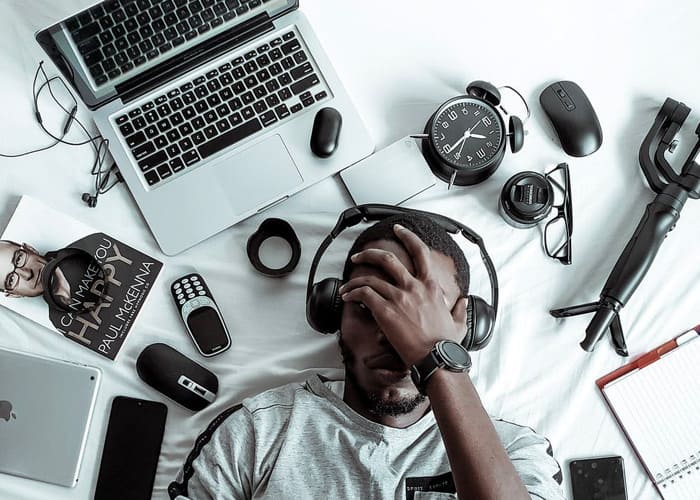Technology has advanced at a pace that has infiltrated nearly every aspect of our lives. Despite this, there is one area that is still lagging – the bedroom. This is quite ironic for many because we spend one-third of our lives in the bedroom and consider it our sanctuaries. So why doesn’t it have convenient, time-saving technology? That is not all. Imagine as many as 16 million UK adults suffer from sleepless nights as a third of the population say they have insomnia.
Technology in the bedroom is increasing in popularity as the healthcare industry uses innovative ways to help people with sleeping difficulties get some restful sleep.
According to a 2011 poll by the National Sleep Foundations, 95% of people claimed they use some form of electronics an hour before going to bed. This includes gadgets such as cell phones, e-readers, tablets, and PCs.
But, using phones and tablets a few hours before bedtime can affect both the quality and quantity of sleep. Ideally, you want to have a technology-free bedroom.
Advantages of technology-free bedroom
There is no denying that a technology-free bedroom can improve your overall sleep by preventing various issues caused by using electronic gadgets at night.
Here are advantages of banishing electronics from your bedroom for good:
You turn your bedroom into an oasis
Once you remove electronics and other disruptive items from your bedroom, you are not just banishing the physical devices themselves. You are also cutting off the link to the outside world.
We are used to being shelled with DMs, emails, WhatsApp messages, and so on. Thus we are always geared up for that next contact with the outside world. Having an electronics-free bedroom offers an oasis of tranquillity in a chaotic world.
Waking up in the morning will be easy and refreshing
If you use your phone as an alarm, consider putting it outside the bedroom so that you will drag yourself out of bed the following day, speeding up your waking up process. And you will have to walk out of the bedroom to turn off the alarm.
But you have to ensure that the phone is in a room that you can still hear. Once you are out of your bedroom, you cannot hit the snooze button.
More and better sleep
Many sleep experts agree that a technology-free bedroom can help you get more and high-quality sleep. This is because your sleep will no longer be disturbed by the beeping, buzzing, and other unpleasant noises associated with electronic devices.
Remove technology from the bedroom
With technology ingrained in our society, the thought of having a technology-free bedroom seems laughable. But there are steps you can take to make this process more straightforward and help to reduce the blue light that keeps you awake.
Assess the kinds of technology you have
Not long ago, the most common technology in our households was televisions. But today, many homes have other electronic devices in addition to TV, including computers and smartphones. An average household in a developed country has at least five electronic gadgets, and up to 18% of homes are highly connected and contain more than 10 devices.
So if you find yourself in such like household, the first step is to evaluate the types of technology you have, including:
- Televisions
- Smartphones
- Tablets
- Video game systems
- Laptops and desktops
- E-readers
- Smart home gadgets like Google Home device and Amazon Echo
- Smartwatches
Of course, you don’t interact with these devices the same way, and thus they will have different charging timetables. This means that some may be easier to get rid of than others, but having an accurate inventory of your household’s electronics is the first step in trying to achieve a bedroom-free environment.
Tips for creating a technology-free bedroom
One of the most influential and prominent ways to make your bedroom technology-free is getting rid of all electronics from your bedroom. This might sound hard at first, but you can find it easy to do it with some helpful tips.
Create a bedtime routine
Consider developing a new bedtime routine to help create healthy habits. However, your new bedtime routine should not involve checking your emails and messages or watching television in the bedroom. Instead, include practical steps in your routine such as putting on nightgowns, listening to binaural beats, reading in dim light, or stretching.
Created a designated space for your electronics
After eliminating all devices from your bedroom, you need a spot outside the bedroom to haul them during the night. Make sure this place has power outlets so that your electronics will have a full battery the next day.
Keep reading material in your bedroom
By removing all your electronics from the bedroom, you are on a path to evoke the joy of reading physical books. So make sure you have something that you can turn to in your nightstand to prevent the fear of missing out from being too far away from your devices.
Don’t bring work to bed
Your bed should be reserved only for sleep and sex. This way, you allow your brain to link being in the bedroom with those tasks, thus reducing or completely cutting out the urge to bring electronics into the bedroom.
Invest in a white noise machine
Some people use their mobile devices to play calming audios at night to help them fall asleep quickly. If this is the case with you, consider getting a white noise machine. You will get the same results, albeit without putting messages and email at your fingertips.
Set boundaries in your bedroom
Most of us feel the need to sleep with our phones in the bed because someone from work, a friend, or family might want to talk to us. But this perceived urge to be accessible 24/7 puts you at the risk of sleep interruptions when you try to sleep.
Moreover, this is just a mindset that is not backed by any facts. So untangle from this web of “always-on” mentality, set some boundaries with your workmates, friends, and family that you will not be accessible during late evening and early in the morning.

 Nectar Mattress
Nectar Mattress 


